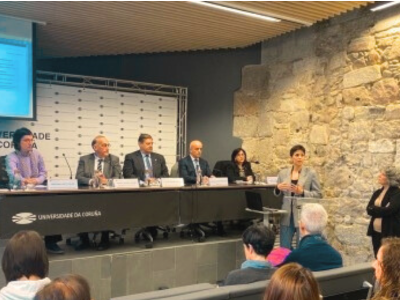This morning, the UDC Rector’s Office hosted the presentation of the Gender Gap Barometer in ICT (Information and Communications Technologies) studies, developed by the ALDABA-WIB (Women, ICT & Business) Chair of the Universities of A Coruña and Vigo, an event presided over by the rectors Julio Abalde (UDC) and Manuel Reigosa (UVigo), along with ALDABA’s Managing Partner Enrique Fernández; the Chair’s co-directors, Virginia Mato (UDC) and Alma Mª Gómez (UVigo); the Director of the UVigo Equality Office, Águeda Gómez; and the UDC Vice-Rector for Equality, Culture, and Sport, Cristina López.
The Barometer aims to provide a comprehensive and up-to-date understanding of the presence of women in ICT degrees, and will be updated periodically. As Virginia Mato, co-director of the UDC Chair, pointed out, there is a “dramatic” drop in the presence of women in upper secondary education, with 54% of students born between 2000 and 2004, and in university ICT degrees, with just 12% in the same age group. The barometer provides information organized into four sections: Access, covering women entering university studies; Results, comparing academic outcomes between women and men; Evolution Indicators, featuring significant metrics and the evolution of female representation in ICT programs; and Generation Analysis, tracking the percentage of women in each generation throughout their academic journey up to high school and comparing it with ICT engineering degrees. In this regard, Alma Gómez pointed out that female university students in ICT degree programs have “slightly” better academic results than their male classmates. “This debunks the myth that women don’t have technological skills,” declared the co-director of the UVigo Chair.
Horizontal segregation is a “worrying” issue in universities, acknowledged Águeda Gómez, director of the Equality Area at UVigo, and university Equality Units are working on it thru various initiatives, such as the Equality Seal promoted by the University of Vigo to recognize practices that integrate and foster a gender perspective. The Vice-Rector for Equality at the UDC, Cristina López, spoke about the initiatives in A Coruña to promote gender equality and affirmed that at the UDC “we are committed to working with men, since it is very important to raise awareness in order to engage them.” Cristina López reflected, in the spirit of the Christmas season, on the types of gifts boys and girls receive, encouraging people to “change the narrative.”
The ALDABA-WIB (Women, ICT & Business) Chair is funded by the Galician company ALDABA, with €150,000 over seven years, motivated on the one hand—as explained by ALDABA’s managing partner, Enrique Fernández—as a social responsibility initiative to give back to society some of what it contributes to the company, and on the other, “because we need the intellectual richness that gender diversity brings to do our work.” Fernández encouraged girls “to take the step into ICT engineering” because “in our teams today we’re missing women,” at a company where 25% of the workforce is female.
The rector of the Universidade da Coruña, who opened the presentation, thanked the company ALDABA for its collaboration and for its “sensitivity to the lack of women in the ICT sector,” which translates into a shortage of talent. Abalde said that “as a university, we aim to foster interest in ICT degrees among girls and women.”
The rector of the University of Vigo closed the presentation by praising the “excellent” work of the Chair, the result of collaboration between the two universities and the company. “This barometer will provide data that will allow us to work in the right direction,” said Reigosa, who affirmed that the universities of A Coruña and Vigo “are sister institutions,” defended inter-university collaboration that has yielded fruits such as this and other joint chairs, and also highlighted the University of Vigo’s support for A Coruña’s bid to host the Spanish Agency for the Supervision of Artificial Intelligence, AESIA.



